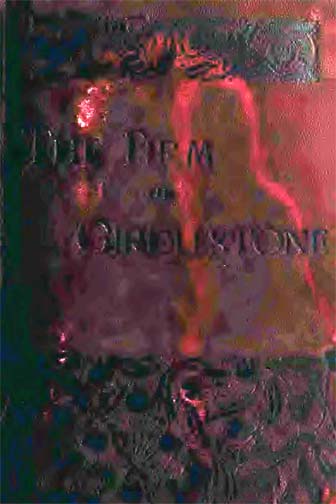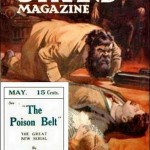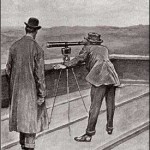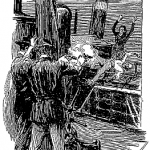
The revelation of the real state of the firm’s finances was a terrible blow to Ezra Girdlestone. To a man of his overbearing, tempestuous disposition failure and poverty were bitter things to face. He had been wont to tread down before him all such little difficulties and obstacles as came across him in his former life. Now he encountered a great barrier which could not be passed so easily, and he raged and chafed before it. It made him still more wroth to think that the fault was none of his. All his life he had reckoned, as a matter of course, that when his father passed away he would be left almost a millionaire. A single half-hour’s conversation had shattered this delusion and left him face to face with ruin. He lost his sleep and became restless and hollow-eyed. Once or twice he was seen the worse for drink in the daytime.
He was a man of strong character, however, and though somewhat demoralized by the sudden shock, he threw away no point in the game which he and his father were playing. He saw clearly that only a bold stroke could save them. He therefore threw himself heart and soul into the diamond scheme, and worked out the details in a masterly manner. The more he looked into it the more convinced he became, not only of its feasibility, but of its absolute safety. It seemed as though it were hardly possible that it should fail.
Among other things he proceeded to qualify himself as a dealer in diamonds. It happened that he was acquainted with one of the partners of the firm of Fugger & Stoltz, who did the largest import trade in precious stones. Through his kindness he received practical instructions in the variety and value of diamonds, and learned to detect all those little flaws and peculiarities which are only visible to the eye of an expert, and yet are of the highest importance in determinating the price of a stone. With such opportunities Ezra made rapid progress, and within a few weeks there were not many dealers in the trade who had a better grasp of the subject.
Both the Girdlestones recognized that the success of their plan depended very largely upon their choice of an agent, and both were of the opinion that in Major Tobias Clutterbuck they had just the man that they were in want of. The younger merchant had long felt vaguely that the major’s social position, combined with his impecuniosity and the looseness of his morality, as inferred from his mode of life, might some day make him a valuable agent under delicate circumstances. As to the old soldier’s own inclinations, Ezra flattered himself that he knew the man’s nature to a nicety. It was simply a question of the price to be paid. No doubt the figure would be substantial, but he recognized with a trader’s instinct that the article was a superior one, and he was content to allow for the quality in estimating the value.
Early one April afternoon the major was strutting down St. James’s Street, frock-coated and kid-gloved, with protuberant chest and glittering shoes which peeped out from beneath the daintiest of gaiters. Young Girdlestone, who had been on the look-out from a club window, ran across and intercepted him.
“How are you, my dear major?” he cried, advancing upon him with outstretched hand and as much show of geniality as his nature permitted.
“How d’ye do? How d’ye do?” said the other somewhat pompously. He had made up his mind that nothing was to be done with the young man, and yet he was reluctant to break entirely with one whose purse was well lined and who had sporting proclivities.
“I’ve been wishing to speak with you for some days, major,” said Ezra.
“When could I see you?”
“You’ll niver see me any plainer than you do at this very moment,” the old soldier answered, taking a sidelong glance of suspicion at his companion.
“Ah, but I wish to speak to you quietly on a matter of business,” the young merchant persisted. “It’s a delicate matter which may need some talking over, and, above all, it is a private matter.”
“Ged!” said the major, with a wheezy laugh, “you’d have thought I wanted to borrow money if I had said as much. Look here now, we’ll go into White’s private billiard-room, and I’ll let you have two hunthred out of five for a tinner—though it’s as good as handing you the money to offer you such odds. You can talk this over while we play.”
“No, no, major,” urged the junior partner. “I tell you it is a matter of the greatest importance to both of us. Can you meet me at Nelson’s Cafe at four o’clock? I know the manager, and he’ll let us have a private room.”
“I’d ask you round to me own little place,” the major said, “but it’s rather too far. Nelson’s at four. Right you are! ‘Punctuality is next to godliness,’ as ould Willoughby of the Buffs used to say. You didn’t know Willoughby, eh? Gad, he was second to a man at Gib in ’47. He brought his man on the ground, but the opponents didn’t turn up. Two minutes after time Willoughby wanted his man to leave. ‘Teach ’em punctuality,’ he said. ‘Can’t be done,’ said his man. ‘Must be done,’ said Willoughby. ‘Out of the question,’ said the man, and wouldn’t budge. Willoughby persisted; there were high words and a quarrel. The docther put ’em up at fifteen paces, and the man shot Willoughby through the calf of the leg. He was a martyr to punctuality. Four o’clock-bye, bye!” The major nodded pleasantly and swaggered away, flourishing his little cane jauntily in the air.




